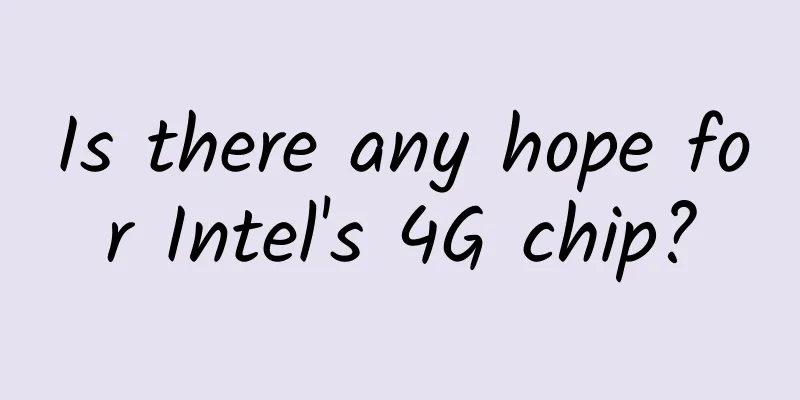Is there any hope for Intel's 4G chip?

|
According to media reports, Intel recently announced that its XMM7262 LTE-Advanced modem (Intel LTE chip for short) has been certified by China Mobile. As Intel's new generation LTE platform, this chip supports multiple network standards such as LTE TDD/FDD, WCDMA/HSPA, TD-SCDMA, TD-HSPA and EDGE. The platform also integrates the following functions: supports up to 23 LTE frequency bands at the same time, supports global coverage and roaming; multi-mode design, realizes seamless connection of 2G, 3G and 4G LTE networks; low power consumption and small size, used to develop network equipment for the mass market. Commentators said that this means that equipment manufacturers using this chip to produce products will be able to support China Mobile's network. This is undoubtedly good news for Intel, which has been struggling to catch up. The so-called passing of China Mobile certification means that the chip is the core component of the mobile terminal and is directly related to the performance of the terminal. Therefore, China Mobile's chip platform certification work is to reduce the basic communication problems of the terminals sent for testing. Therefore, the LTE chips used in China Mobile's terminals need to be certified before the terminal products are put into storage. After the chip products pass the certification, the terminals using this chip can shorten the testing cycle and be put on the market as soon as possible. The author believes that, in addition to this, this news also releases the following information: First, this is related to the case of Qualcomm being investigated for suspected monopoly. From the beginning of the year to now, the shipment of 4G mobile phones in the domestic market has reached tens of millions of units, and Qualcomm has played an indispensable role in this. However, the antitrust investigation it triggered has also become a dark cloud hanging over it. Now it is facing a huge monopoly fine of nearly 10 billion yuan. Therefore, starting from the second half of this year, more chip manufacturers will receive "gifts" from the domestic 4G market, including MediaTek, Marvell, Spreadtrum, and of course Intel. Intel's efforts in mobile chips are obvious to all. Before launching this chip, the company launched the LTE chip XMM7260 at the Information Technology Summit held in Shenzhen this spring. At that time, it was introduced that this product met the "five-mode and ten-frequency" specifications of China Mobile, and this product was also adopted by Samsung's mid-range mobile phone Galaxy Alpha. Now Intel is launching new chip products non-stop, and with the help of China Mobile, the current 4G leader, its intention to catch the express train of the domestic 4G market as soon as possible is very obvious. Although it cannot compete with Qualcomm, it can also compete with rivals such as MediaTek to compete for the position of "second place" or "third place". Secondly, Intel has been wavering in its strategic positioning and business model of mobile chip products, largely due to the lack of an influential terminal manufacturer as its partner. In 2012, Intel and Lenovo jointly launched the K800 mobile phone equipped with the former's processor. Although it was an attempt on mobile phones, I heard that all the expenses of this mobile phone were borne by Intel, which also shows Intel's "self-abasement" mentality. When its own products cannot make a name for themselves, it would rather "lose money to gain publicity." But this time is different. I believe that Intel's XMM7262 is a product aimed directly at Apple's iPhone. You may have heard that Intel missed out on huge commercial benefits in the early years because it did not see the prospects of the iPhone, but they did not give up this opportunity and have been in contact with Apple, eager to enter Apple's supply chain (although Apple's Mac computer processors have always been supplied by Intel, but this is not within the scope of this article). Seeing this, you may ask, isn't Apple's mobile phone using their own chips now? Yes, last year's A7 and this year's A8 are all application processors designed by Apple, but please note that Apple makes application processors, not baseband processors. In Apple's iPhone, the application processor chip and the baseband processor chip are two separate chips. Due to the high technical content, the baseband chip can only be supplied by Qualcomm for the time being (data show that Qualcomm has captured most of the global market share of smartphone baseband chips), and Intel has always wanted Apple to abandon Qualcomm and embrace its own baseband chips. The technological progress of XMM7262 is the reason why Intel is trying to persuade Apple. In fact, for Apple, it is also annoying to always hold Qualcomm. Here, the author also boldly speculates that with Intel's technology, there is a possibility that Apple's new iPhone will adopt their products next year, and the probability is not low. But the author also wants to say that although Intel's technology in baseband chips is worthy of recognition, its weaknesses cannot be ignored, that is, SoC is still a little bit lacking. Third, Intel's LTE chip has passed China Mobile's certification this time. There is also a possibility that they will create their own mobile phone products, but they have said before that they will not make Intel-branded mobile phones. Therefore, in terms of strategy, they should cooperate with telecom operators and sell them under the operator's brand. Use the operator's channel capabilities to improve shipment performance. There have been rumors that Intel will cooperate with operators in emerging markets such as China and India to launch smartphones. Now that the LTE chip has passed China Mobile's certification, it is an opportunity. Although Intel has been looking for opportunities to erode Qualcomm, there are still considerable difficulties in the cost, business model and ecosystem construction of mobile chips. However, Intel, which is well-funded, seems to be more and more leisurely in the development of mobile chips. Who can say that their mobile chips will not rise, thereby changing the weight of this business within Intel? As a winner of Toutiao's Qingyun Plan and Baijiahao's Bai+ Plan, the 2019 Baidu Digital Author of the Year, the Baijiahao's Most Popular Author in the Technology Field, the 2019 Sogou Technology and Culture Author, and the 2021 Baijiahao Quarterly Influential Creator, he has won many awards, including the 2013 Sohu Best Industry Media Person, the 2015 China New Media Entrepreneurship Competition Beijing Third Place, the 2015 Guangmang Experience Award, the 2015 China New Media Entrepreneurship Competition Finals Third Place, and the 2018 Baidu Dynamic Annual Powerful Celebrity. |
<<: There are still five hurdles for smart hardware to go from being popular to being a hot seller
Recommend
Mudanjiang Mini Program Production Company, how much does it cost to make a food ordering mini program?
The main factors affecting the price of mini prog...
Some of the best tricks for iOS development
Some tips for iOS What should I do if TableView d...
What are the functions of the office rental mini program? How much does it cost to develop a rental app?
Nowadays, many companies choose to rent an office...
Don’t know how to promote events? Here is a set of event operation templates!
Written in front: The protagonist of this templat...
300 days after the new online car-hailing policy, Didi and others’ 6-year roller coaster ride has not yet reached the end
On November 1, 2016, the Interim Measures for the...
The majestic dream-eating monster has become the great enemy of the national treasure
What animal can you think of that looks a bit lik...
One month on station! What has the crew of the "Dragon Horse Spirit" been busy with?
At 20:50 on June 5, 2022, the Shenzhou XIV astron...
Experience of Skyworth Q+ 2nd generation TV box
Last year, Skyworth and Tencent jointly launched ...
Sleeping all day long, who is the "king of sleep" in the animal kingdom?
Produced by: Science Popularization China Author:...
Go 1.4 is officially released, officially supports Android
[[124626]] Go 1.4 is officially released, the fif...
How to make a good online event promotion plan?
In marketing psychology, herd mentality, the ment...
Are mobile programmers having an easy time in 2017?
2016 was undoubtedly a year of anxiety and confus...
Where did the warning color of locusts come from?
Produced by: Science Popularization China Author:...
Astonishing amounts of liquid water have been found on Mars! Why are humans so persistent in finding water in space?
Popular Science Times reporter Chen Jie Shi In th...
Tips for choosing advertising channels!
As of today in 2020, with the rapid rise and matu...









